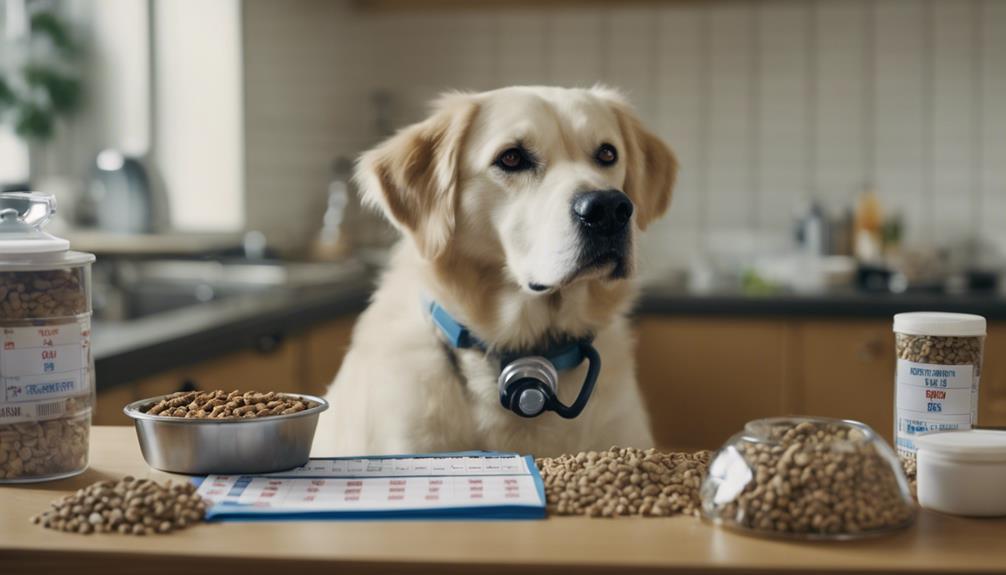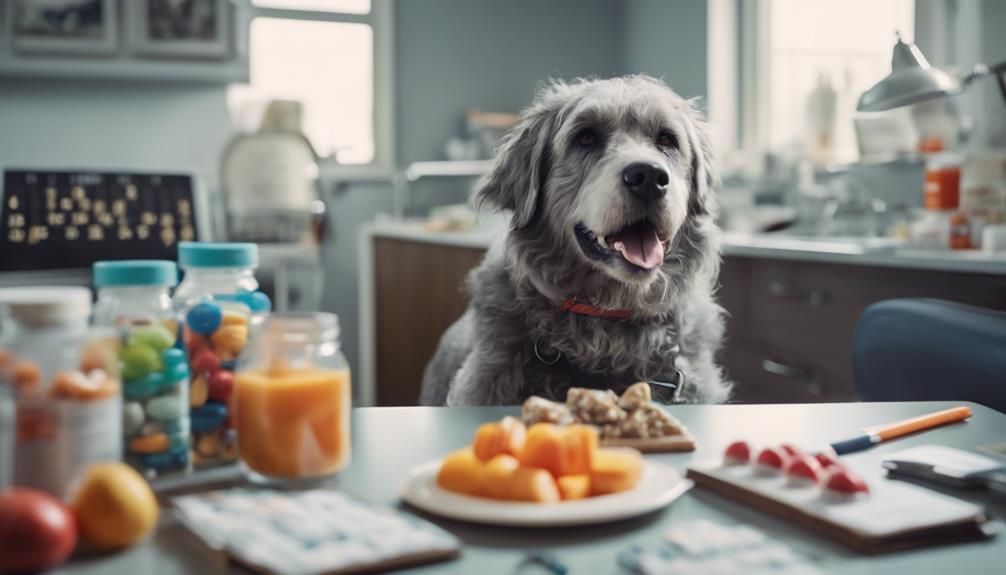Best Diet for Senior Dogs: What You Need to Know
- Advertisement -
As your dog enters its golden years, it becomes crucial to provide a diet for senior dogs that is specifically tailored to meet their unique nutritional needs. This approach can significantly impact their overall health, longevity, and quality of life. Senior dogs benefit from a balanced diet rich in protein, which helps maintain muscle mass and strength, while probiotics play a vital role in supporting their immune system and regulating inflammation. Learn more about the nutritional needs of senior dogs from the American Kennel Club. Managing your senior dog’s weight is also pivotal, as obesity is a common issue in older dogs. Fiber is indispensable for digestive health, ensuring that your dog remains comfortable and active. By thoroughly understanding your dog’s individual needs and choosing the right diet for senior dogs, you can make a substantial difference in their health and well-being. There are numerous aspects to explore to ensure that your aging companion receives the best possible care, from selecting the appropriate dog food to understanding the specific dietary requirements that come with age.
Key Takeaways
- A senior dog’s diet should be rich in protein to maintain muscle mass and strength, with some needing up to 50% more protein than younger dogs.
- Managing weight is crucial, as obesity is a common issue in older dogs, and a balanced diet with probiotics supports immune function and reduces inflammation.
- A limited-ingredient diet or novel protein sources like venison or duck can help reduce allergic reactions in sensitive dogs and support digestive health.
- A senior dog’s ideal body condition is a score of 4 or 5 on a 9-point system, and maintaining a healthy body condition is vital for overall health and life expectancy.
- A diet tailored to life stage, incorporating antioxidants, omega-3 fatty acids, and essential nutrients, can reduce oxidative stress and inflammation, promoting overall health and longevity.
Understanding Senior Dog Nutrition
As your dog reaches senior status, their nutritional needs change significantly.
They require a tailored diet that addresses their individual needs.
Senior dogs need a diet rich in protein to maintain muscle mass and strength. They may need up to 50% more protein than younger dogs.
A well-balanced diet with probiotics supports their immune system by regulating immune responses and reducing inflammation. Probiotics also aid in digestion and nutrient absorption, ensuring your senior dog gets the most out of their meals.
Managing your senior dog’s weight is crucial, as obesity is a common issue in older dogs.
A balanced diet with carefully managed fat content helps prevent weight-related health problems. Long-chain omega-3 fatty acids, such as EPA and DHA, are beneficial for dogs with arthritis or mobility issues, as discussed in beneficial therapies for dog joint health. However, high doses of these fatty acids are necessary to see improvement in joint health.
Maintaining lean body mass is essential for your senior dog’s health.
Losing lean body mass is associated with an increased risk of illness and death. A well-balanced diet that takes into account your dog’s individual needs helps prevent disease and promotes overall health. By understanding the unique nutritional requirements of senior dogs, you can provide your dog with the best possible care, supporting their health and well-being as they age.
Nutritional Needs and Health Issues
As your dog ages, their nutritional needs become closely tied to their health issues.
To provide the best care, you need to understand these connections.
First, managing your dog’s weight is crucial.
Senior dogs require fewer calories due to their slower metabolism and reduced activity level. This helps prevent obesity and related health problems.
For sensitive dogs, a limited ingredient diet or novel protein sources like venison or duck can help reduce allergic reactions.
Protein is essential for maintaining muscle mass and strength in senior dogs.
Some may need up to 50% more protein than younger dogs.
Fiber is also vital for digestive health, and higher-fiber diets can improve gastrointestinal health and reduce the risk of constipation.
Vitamin and mineral supplements can support joint health and immune function in senior dogs.
Antioxidants help reduce oxidative stress and inflammation, which is particularly important for seniors.
Depending on individual health issues, such as arthritis, kidney disease, or heart disease, senior dogs may require different nutrient profiles.
Consult with a veterinarian to determine the best diet for your senior dog’s specific needs.
Choosing the Right Diet for Senior Dogs

Selecting the perfect diet for senior dogs is crucial for maintaining their health and well-being as they age. As dogs grow older, their energy needs decrease by approximately 1-2% per year after the age of five, making it essential to choose a lower-calorie diet for senior dogs to prevent obesity.
Senior dog foods are specially formulated to address these reduced energy needs, ensuring your dog receives the right nutrition without excess calories. For pet owners with multiple dogs, multi-stage diets offer a convenient solution, while limited-ingredient and grain-free options provide excellent hypoallergenic benefits for dogs with food sensitivities and allergies.
When choosing a diet for senior dogs, it’s important to consider your dog’s specific needs, such as lean body mass, fatty acid requirements, and overall caloric intake. Cornell University’s veterinary nutrition experts provide further guidance on selecting food for senior dogs. These factors can vary depending on your dog’s size, breed, and any existing health conditions. For instance, larger breeds may require a different diet than smaller breeds to ensure they remain healthy and active.
Your veterinarian is a key partner in selecting the most suitable diet for senior dogs. They can help identify any underlying health issues and suggest the necessary supplements and dietary adjustments to keep your dog in optimal health.
Additionally, look for senior dog foods that include glucosamine and chondroitin to support joint health, which can be particularly beneficial as your dog ages and may face age-related joint challenges.
Managing Weight and Body Condition
Monitoring your senior dog’s weight and body condition is crucial to prevent obesity, which can worsen age-related health issues. VCA Animal Hospitals offers detailed advice on feeding mature and senior dogs.
As dogs age, their metabolism slows, making weight gain easier. Maintaining a healthy body condition is vital for overall health and life expectancy.
Provide a balanced diet that meets your dog’s nutritional needs, avoiding overfeeding or underfeeding, which can lead to health problems.
A senior dog’s ideal body condition is a score of 4 or 5 on a 9-point system, characterized by a visible waistline, palpable ribs, and minimal fat over the spine and ribs.
To achieve this, decrease your dog’s daily caloric intake by 20-25%.
Instead of free-feeding, feed your senior dog 2-3 main meals and 1-2 snacks per day to manage their weight and prevent overeating.
Use a weight management formula or senior dog food with a balanced nutrient profile to support healthy weight loss and maintenance.
- Advertisement -
This is especially important since older pets may require fewer calories due to reduced activity levels.
By feeding a nutrient-rich diet and monitoring their body condition, you can help your dog maintain a healthy weight and body mass, ensuring they remain healthy in old age.
Work with your veterinarian to determine the best weight management plan for your dog’s specific needs.
Maintaining Health and Longevity

Feeding your senior dog a balanced diet is crucial for maintaining their health and longevity.
As they age, their nutritional needs change, and a diet tailored to their life stage can make a significant difference. Senior dogs require fewer calories, more fiber, and controlled levels of fat, protein, phosphorus, and sodium to support age-related changes and health issues.
Incorporating novel protein sources and limited-ingredient diets can help manage food sensitivities and promote overall health.
A diet rich in antioxidants, omega-3 fatty acids, and essential nutrients can reduce oxidative stress and inflammation, promoting healthy aging and reducing the risk of age-related diseases.
A senior dog’s diet should also support joint health, cognitive function, and immune system function to improve their quality of life and longevity.
Regular monitoring of their weight, body condition, and overall health is vital, along with adjustments to their diet and exercise routine as needed.
Frequently Asked Questions
What Diet Should a Senior Dog Have?
For a senior dog, a balanced diet is crucial.
Focus on high-quality protein sources, moderate carbohydrate intake, and adequate fiber content to support digestive health.
Omega-3 fatty acids benefit joint health, while antioxidants and vitamin supplements support overall well-being.
Ensure the diet has the right mineral ratios.
A well-balanced diet that addresses these considerations will help your senior dog thrive.
What Is a Good Feeding Schedule for a Senior Dog?
Establish a consistent feeding routine for your senior dog by dividing their daily ration into 2-3 meals. This helps manage weight and blood sugar levels.
Space out snacks to prevent overeating and control portion sizes to avoid digestive upset. Monitor your dog’s hunger cues and adjust meal frequency accordingly.
Feed your dog at the same time every day to regulate their digestive system and metabolism. A steady eating pace is also important.
Is Wet or Dry Food Better for Senior Dogs?
When choosing between wet and dry food for your senior dog, consider the benefits of wet food.
Wet food typically has a higher moisture content, making it easier to digest. It’s also often more appealing to dogs and retains nutrients better than dry food.
On the other hand, dry food has some drawbacks. It usually has a lower moisture content, and its shelf life can be a concern.
Weigh these factors to decide what’s best for your senior dog’s specific needs.
Remember, every dog is different, so it’s essential to consider your pet’s requirements when making a decision.
If your dog has kidney issues, for example, a higher moisture content may be beneficial. If your dog has dental problems, dry food might be a better option.
Think about your dog’s health, lifestyle, and preferences to make an informed decision.
What Is the Food Portion for a Senior Dog?
Feeding a senior dog requires careful portion control.
To maintain their ideal body condition, reduce their daily calories by 20-25% to slow down age-related changes.
Divide their daily food into 2-3 meals to control meal size and support weight management.
Consider their caloric needs and nutrient density when determining portion sizes.
Regularly weigh and monitor your dog’s body condition to adjust feeding times as needed.
This ensures a healthy and happy senior companion.
In summary
Providing a well-balanced diet for senior dogs is essential for maintaining their overall health and well-being. As dogs age, they often face challenges like arthritis, which impacts about 50% of dogs over the age of 7.
By focusing on the right diet for senior dogs, along with proper weight management, you can help ease the discomfort associated with arthritis and other age-related conditions. To ensure your senior dog enjoys a healthy and comfortable life, it’s crucial to prioritize their unique nutritional needs.
Incorporating high-quality proteins, joint-supporting nutrients, and antioxidants can make a significant difference in their quality of life.
- Advertisement -

